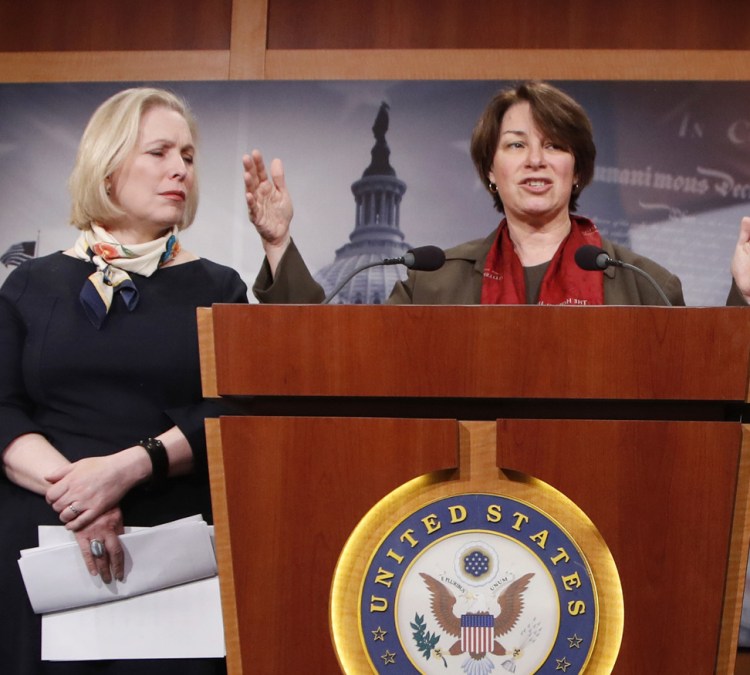A dozen possible Democratic presidential candidates assembled at a downtown Washington hotel Tuesday for one of the first cattle calls of the 2020 campaign. The good news: There were, on that stage, all of the personal qualities and policy ideas needed to defeat President Trump. The bad news: These qualities and ideas were not in any one person.
The perfect candidate to dethrone Trump would have Ohio Sen. Sherrod Brown‘s blue-collar appeal, the youth of Sen. Chris Murphy of Connecticut, the looks of Rep. Joe Kennedy of Massachusetts and the moral clarity of Vermont independent Sen. Bernie Sanders. She would have the sensibility of Sen. Amy Klobuchar of Minnesota, the feminist firepower of New York Sen. Kirsten Gillibrand and the populist fervor of Sen. Elizabeth Warren of Massachusetts. He would have the oratory of former Obama Housing and Urban Development Secretary Julian Castro, New Jersey Sen. Cory Booker‘s facility with data, the earnest wonkery of New York City Mayor Bill de Blasio and Washington state Gov. Jay Inslee, and the wealth of billionaire environmental activist Tom Steyer.
That ideal candidate would also be able to harmonize the cacophony of agenda items I heard over several hours: higher minimum wage, huge infrastructure spending, more broadband access, two years of free college, free public universities, universal pre-K, universal health care, fair housing, police reforms, national paid leave, equal pay for equal work, clean air, clean water, climate action, LGBT rights, cracking down on predatory lenders, tax incentives for poor areas, a federal job guarantee, election protections, as well as criminal-justice, campaign finance and immigration reforms, and higher taxes on the wealthy and corporations, gun control and more.
In fairness, the Center for American Progress’ annual Ideas Conference was structured to cover the full range of progressive ideas. But it also served to highlight the difficulty Democrats will have in developing a coherent alternative to Trump. Many of the ideas advanced have widespread support, and many are big ideas. But the best way to put them all together still bedevils Democrats, just as it did Hillary Clinton, who in 2016 had a proposal for everything but seemed to say nothing.
For November’s midterm elections, it may be enough for Democrats to say they are against Trump. Congressional Democratic leaders took a stab at a unified agenda for 2018 – “A Better Deal” – and were roundly mocked by progressives.
But to beat Trump, they’ll need more. Trump convinced tens of millions of Americans that they are losing ground because of immigrants, racial and religious minorities, and foreigners. What will Democrats advance to counter that grim message?
Booker, using a roving microphone to deliver his keynote, auditioned as “one of those senators who, when I shop at my local bodega, I see people using food stamps.” Brown offered his crossover appeal: “Trump won my state by almost 9 points.” Klobuchar went for regional appeal: “The Midwest cannot be left behind at the gas station in 2020.” De Blasio let them know New York crime is down four years in a row.
“I’m writing a children’s book on the history of suffrage,” Gillibrand announced.
“I co-authored a book on clean energy a few years ago,” said Inslee.
They also tried out some prospective campaign lines.
“If it wasn’t Lehman Brothers, but Lehman Sisters, we might not have had the financial collapse,” ventured Gillibrand.
“Which side are you on?” asked Brown. “Are you on the side of Wall Street or the side of the little guy?”
Contributed Klobuchar: “We resist, but we also insist, on a better way forward.”
Yes, but which way? The would-be candidates pointed in all directions.
Warren spoke of automatic voter registration. “Democrats are the party of ideas – lots of ideas,” she said, listing a dozen. “Most of these ideas won’t go anywhere until we deal with the defining crisis of this moment in our history. … Democracy is crumbling around us.”
Sanders, with one presidential run under his belt, was better than most at articulating a unified theory. He spoke of tuition-free public universities, ending institutional racism and the war on drugs, reforming criminal justice and immigration, and fighting climate change – “but there is one issue out there which is so significant and so pervasive that, unless we successfully confront it, it will be impossible for us to succeed on any other of these important issues.”
And that is inequality. “The oligarchy in this country, whose greed is insatiable, is destroying Lincoln’s view of America, our vision of America, and is leading us to a government of the few, by the few and for the few.”
This is a big idea. Maybe the big idea. Whoever can best make that case should lead the Democrats in 2020.
Dana Milbank is a columnist for The Washington Post. He can be contacted at:
Send questions/comments to the editors.



Success. Please wait for the page to reload. If the page does not reload within 5 seconds, please refresh the page.
Enter your email and password to access comments.
Hi, to comment on stories you must . This profile is in addition to your subscription and website login.
Already have a commenting profile? .
Invalid username/password.
Please check your email to confirm and complete your registration.
Only subscribers are eligible to post comments. Please subscribe or login first for digital access. Here’s why.
Use the form below to reset your password. When you've submitted your account email, we will send an email with a reset code.